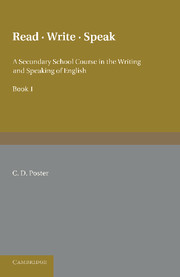Book contents
- Frontmatter
- Acknowledgements
- 1 When I was young
- 2 A Modern Mythology
- 3 The Magic Shop
- 4 Portraits
- 5 The Fair
- 6 Letters
- 7 The Waxworks
- 8 A Matter of Size
- 9 Facts and Figures
- 10 Tall Tales
- 11 Painting with Words
- 12 Telling a Tale
- 13 Brandon
- 14 Seeing and Observing
- 15 In the Dark
- 16 Strange Creatures
- 17 MACHINES
- 18 No Noses
- 19 Diaries
- 20 The Fox's Foray
1 - When I was young
Published online by Cambridge University Press: 05 June 2016
- Frontmatter
- Acknowledgements
- 1 When I was young
- 2 A Modern Mythology
- 3 The Magic Shop
- 4 Portraits
- 5 The Fair
- 6 Letters
- 7 The Waxworks
- 8 A Matter of Size
- 9 Facts and Figures
- 10 Tall Tales
- 11 Painting with Words
- 12 Telling a Tale
- 13 Brandon
- 14 Seeing and Observing
- 15 In the Dark
- 16 Strange Creatures
- 17 MACHINES
- 18 No Noses
- 19 Diaries
- 20 The Fox's Foray
Summary
When you were six or seven and you first began to write stories you probably wrote something like this:
THE GIRL WHO HAD A TEDDY BEAR THAT DANCED
Chapter I
One night a little girls mummy said it is time for bath and the little girl said right shall I run the bath yes you may said her mummy and she switched the tap on and went to dance with her teddy bear for a long time till her mummy called are you in bed dear and she called back I am not in the bath yet because I forgot and she went into the bathroom and the bath had overflown and she burst into tears and her mummy said what are you crying for and the girl said the bath has overflown
If I were to ask you what is wrong with this you would have no difficulty in replying. ‘ There is no punctuation,’ you will observe; and ‘ It goes on and on with and… and…and.’ In fact I have no right to be asking you what is wrong. Sara has written this for herself, never dreaming that it would one day appear in a school textbook. For her, at six and a half, writing is only a way of putting down what she wants to say, and, because she is going to read this story to her teacher, she does not feel the need to put in punctuation marks. She knows when to pause for breath, she knows when to put a certain expression into her voice that indicates that someone is speaking, and so she does not require anything to prompt her. Furthermore, all her efforts are at this stage bent on making her pencil make the letters that make the sounds that make the words that make the sense of what she wants to say.
I have said that, at six and a half, writing is only a way of putting down what the writer wants to say. Is not that equally true of sixteen and a half, or sixty and a half? What happens, as we get older and more experienced, is that our control over our written word becomes greater than our control over our spoken word (though that improves too).
- Type
- Chapter
- Information
- Read Write Speak , pp. 1 - 8Publisher: Cambridge University PressPrint publication year: 2013



